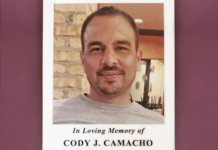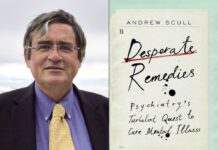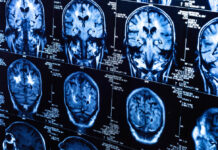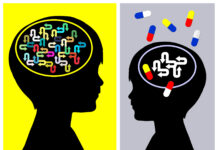Anatomy of an Industry: Commerce, Payments to Psychiatrists and Betrayal of the Public Good
Pharmaceutical companies paid psychiatrists $340 million from 2014 through 2020, corrupting every aspect of the testing and marketing of new psychiatric drugs.
Q&A: How Can We See ADHD From Another Angle, and What Can We Do...
We all want to help our kids or our students, and sometimes finding the right key to unlock a child’s gifts is a matter of time, patience, trial, and error.
Green Star Mother Demands Answers from VA Secretary
If the Veterans Administration is sincere in wanting to reduce veteran suicides, the first place to start is to collect information following these deaths to try to better understand the causes.
The Nurtured Heart Approach Goes Mainstream: Research and Experience Support “Celebrating Greatness in Every...
The Nurtured Heart Approach represents a massive shift in thinking—about schooling, about children and how to raise them, about how we regard those with intensity, and about the medical model pathologizing them.
Andrew Scull—Desperate Remedies: Psychiatry’s Turbulent Quest to Cure Mental Illness
Sociologist and author Andrew Scull discusses the history of psychiatry's "Desperate Remedies," from lobotomy and the asylum to the failures of today's drugs and the fads of ketamine and deep brain stimulation.
David Healy – Polluting Our Internal Environments: The Perils of Polypharmacy
On the MIA Podcast, Dr David Healy discusses World Tapering Day, antidepressant treatment and sensory neuropathy and the difficulties that can be encountered when trying to deprescribe.
The Clinical, Social, and Cultural Harm of an Iatrogenic Psychiatry
Normal reactions transformed into illnesses, emotions stripped of meaning, & people deprived of their autonomous coping skills and supports.
Thomas Szasz Versus the Mental Health Movement
Unbiased experts must examine the claims and research of psychiatry and issue a report as to whether psychiatry not only has a valid medical basis, but whether this basis justifies the widespread violation of medical ethics and the routine use of imprisonment and torture.
A Neuroscientist Evaluates the Standard Biological Model of Depression
Current evidence does not support a biological hypothesis of depression. It is far better predicted by levels of childhood trauma, life stress, and lack of social supports.
“Confidential” 988 Conversation Records Shared with Corporations
Recordings of 988 callers’ voice, text, and chat conversations are being shared with researchers, AI developers, and corporations without consent.
The Connection Cure: An Interview with Julia Hotz
Julia Hotz is a solutions-focused journalist based in New York City. She is the author of the forthcoming book, The Connection Cure: The Prescriptive...
Overuse of Psychiatric Drugs is Worsening Public Mental Health, Doctor Argues
A new research article asserts that the overuse of psychiatric drugs may create neurobiological changes that hamper long-term mental health recovery.
Suicide Hotlines and the Impact of Non-Consensual Interventions
Those struggling with suicidal thoughts may stay silent instead of reaching out to suicide hotlines because they fear non-consensual intervention and the harmful impact of police involvement.
Threatened for Telling the Truth: Polish Journalist Speaks Out
Now I’m under attack, with threats of violence flung at me alongside threats of lawsuits. And all because I shared the large body of peer-reviewed research that contradicts the mainstream assumptions of psychiatry.
Teen Arts Exhibition: Beyond Labels And Meds: What It Feels Like To Be Me
28 teen artists share the power of their creativity in this collection of profoundly moving, courageous, and beautiful artwork.
The Dying of the Light: Norway’s “Medication-Free” Services for Psychotic Patients Are Fading Away
Despite their successful outcomes, Norwegian non-coercive and medication-free programs are being threatened with closure.
Making Mental Health an Ongoing Priority: A Patch Adams Approach
My brother’s sudden death and Mental Health Awareness Month spurred me to spend May making small, very personal efforts to both honor his memory and move the mental health conversation forward.
Roll-out of 988 Threatens Anonymity of Crisis Hotlines
Even after their own advisory committee criticized call tracing, leaders of the National Suicide Prevention Lifeline have been lobbying government for cutting-edge mass surveillance and tracking technology. Privacy experts are raising concerns.
Busting the Deinstitutionalization Myth: We Actually Have More Beds Than Ever Before
New data upends common beliefs about asylum closures, deinstitutionalization, and rates of psychiatric coercion.
A Bicultural Māori/European Vision for a Truly Healing Hospital
Our therapies need to treat the root causes of mental distress—especially trauma and environment—and not just numb the pain.
How Western Psychology Can Rip Indigenous Families Apart: An Interview with Elisa Lacerda-Vandenborn
An interview with Elisa Lacerda-Vandenborn about the consequences \psychology and mental health treatment can have for indigenous children.
The TikTokification of Mental Health on Campus
Many people view their social media feeds as reflections of their identities—and when posts center on a specific diagnosis, it can feel like the platform is diagnosing them.
Waking From the Nightmare: Is Recovery From Akathisia Possible?
I had a chemical brain injury from medications. The only help doctors could offer was more medications: treating the failed treatment with other dangerous treatments.
WHO and the Sea Change in Mental Health: Interview with Michelle Funk
MIA's Ana Florence interviews Michelle Funk about her leadership of the new WHO guidelines on rights-based mental health.
Psychiatric Detentions Rise 120% in First Year of 988
As contacts to the new 988 suicide hotline number have risen, so have call tracing and police interventions.

































